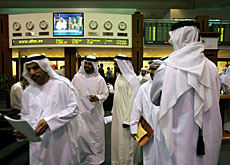Swiss risk losing Islamic goldmine

Plans by Arab partners to set up an Islamic private bank in Switzerland have highlighted a largely unexploited market of Muslim wealth based in Western countries.
Many Swiss banks offer products that comply with Sharia law, but little is being done to tap into the $200 billion (SFr199 billion) of Arab funds being managed in Geneva, according to one asset manager.
The National Bank of Kuwait is reportedly teaming up with a Saudi Arabian partner to follow on the heels of Faisal Private Bank, which became the first such Islamic institution to set up in Switzerland in 2006.
But there are simply not enough financial products being created in the West for Muslim clients, according to John Sandwick, managing director of Swiss asset management firm Encore Management.
“There seems to be paralysis among the institutions in developing the Islamic asset management industry here,” Sandwick told swissinfo. “There seems to be no enthusiasm to convert traditional asset management into Islamic wealth management, which only requires the introduction of Islamic products.”
The Swiss authorities should also follow the lead of Britain and the United States by providing clear guidelines on the taxation of Islamic products, Sandwick added.
Market growing
The Islamic banking sector, recently inflated by rising oil prices, is estimated to be worth between $500 billion and $800 billion (SFr497-795 billion). It is growing by about 20 per cent a year and could be worth thousands of billions in the near future.
The $200 billion of Arab riches deposited in Switzerland is also likely to mushroom. Not all of this wealth requires Sharia compliant management, but many clients would opt for such a fund if they had the choice.
Switzerland’s leading banks have been in the Islamic finance market for several years as they expand their operations in the Middle East.
Credit Suisse started by offering Sharia compliant solutions tailored to clients’ needs and has become more focused in the past two years, having established a Sharia board and a team of specialists in Zurich, New York, London and Dubai.
“Because of Sharia guideline constraints in the Islamic market, all asset classes were not efficiently available in the past and therefore were not as competitive as the conventional sector,” Michael Fouad Chahine, the bank’s Global Head of Islamic Banking Distribution, told swissinfo.
Left behind?
Chahine highlighted the non-interest bearing Sukuk Sharia bond market as an example of how Islamic products are catching up with the established market.
“The development of Islamic banking has so far been limited to countries with a higher percentage of Muslims,” said Chahine. “But this is changing as more international regulators accept the importance of Sharia. It is now also accepted as socially responsible banking.”
But Sandwick worries that the West is still lagging behind financial centres such as Singapore, Kuala Lumpur, Dubai and Bahrain.
“If no effort is made whatsoever, I am afraid the world will pass Switzerland by in the race to control the rich prize: which today is worth hundreds of billions, but in the future will be trillions of dollars of Islamic wealth,” he said.
swissinfo, Matthew Allen in Zurich
Sharia law prohibits the payment or charging of interest – called usury in the Koran. Products such as Sukuk bonds get around this employing a system of sharing capital gains.
The United States and Britain recognise that certain capital gains from Islamic products are tax exempt, but most European countries do not follow this principle.
Investments are limited to products sanctioned by a fatwa – an edict of approval from an Islamic scholar. Products associated with gambling, alcohol, tobacco, pornography and pork production are outlawed.
Swiss banks that offer Sharia compatible services cannot be called Islamic banks. Only institutions from Muslim countries can carry this title.

In compliance with the JTI standards
More: SWI swissinfo.ch certified by the Journalism Trust Initiative











You can find an overview of ongoing debates with our journalists here . Please join us!
If you want to start a conversation about a topic raised in this article or want to report factual errors, email us at english@swissinfo.ch.